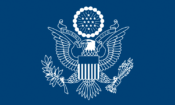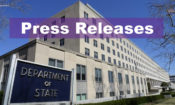U.S. Statements by Ambassador Dennis Shea
WTO General Council Meeting
December 16, 2020
ITEM 4. THE DEVELOPMENT ASSISTANCE ASPECTS OF COTTON
· The United States thanks Burkina Faso and the other C-4 Members for their submission for an Action Plan to Enhance Support for Cotton By-Product Development in LDCs found in document WT/GC/W/808.
· We have participated in various discussions convened under the auspices of the Director General’s Consultative Framework Mechanism on Cotton and have been pleased to hear directly from the C-4 Members and others on issues such as: cotton production and trade trends, benefits that have resulted from cooperative technical assistance cooperation efforts, and domestic cotton sector reforms.
· We welcome efforts of the C-4 and other cotton-producing members to further develop their domestic industries, including expanding opportunities for cotton by-products, and we believe that focusing efforts and energy on improving the domestic investment and regulatory environments would be the most productive way to encourage and foster innovations in this important agricultural industry.
· We have undertaken a preliminary review of this proposal and have some initial questions we intend to share with the proponents. We would welcome direct engagement from the proponents in order to ensure that any potential outcome in this area reflects a shared view of the expected outcomes from this Action Plan and that any future engagement in the Consultative Framework be consistent with the goals and competencies of the organization.
· We hope to be in a position to offer more concrete feedback on this proposal at a future meeting.
· We stand ready to work constructively with the C-4 going forward.
ITEM 5. TWELFTH SESSION OF THE MINISTERIAL CONFERENCE – DATE AND VENUE
· The United States joins others in noting our appreciation to the Government of Kazakhstan for its offer to host MC12.
· As we reflect on the current state of the global pandemic and on possible scenarios for 2021, it would appear to us that June 2021 is no longer a realistic target. The organization would be better served by making the decision soon to begin planning for a date later in the year, most likely returning to the normal timeframe of December.
· We urge Members to seriously consider reaching a decision early next year to identify a date for the Ministerial Conference that takes into account the evolution of the pandemic and the need to provide a predicable timeframe to help guide our work ahead.
ITEM 6. WORK PROGRAMME ON ELECTRONIC COMMERCE
· To the points raised by India and South Africa, issues under the Work Program have regularly been discussed in General Council meetings, in meetings of the WTO sub-bodies, and in recent informal, open-ended General Council meetings.
· In order to ensure that there is sufficient Member interest to sustain a productive discussion, the United States prefers that these discussions continue to proceed on the same basis that they have to date. We do not see a need to establish any new standing agenda items for the General Council or in the sub-bodies.
· The United States is, in general, open to further discussions on the moratorium in advance of MC12. We thank India and South Africa for helping us better prepare for today’s meeting by submitting views in writing. If there are future steps taken on these issues, we continue to ask that proponents submit their proposals for such discussions in writing, and work with interested members to ensure a balanced agenda and panel of speakers.
· Over more than 20 years, the moratorium on customs duties on electronic transmissions has supported the rapid growth of digital trade.
· Yet, we note that some Members have continually highlighted the importance of the Work Program while also signaling their potential opposition to the continued renewal of the moratorium. We note the relationship between the Work Program and the moratorium in Ministers’ 1998 decision, and in subsequent Ministerial decisions. If the moratorium were to be discontinued, it is unclear that there would be a consensus to continue the Work Program.
















